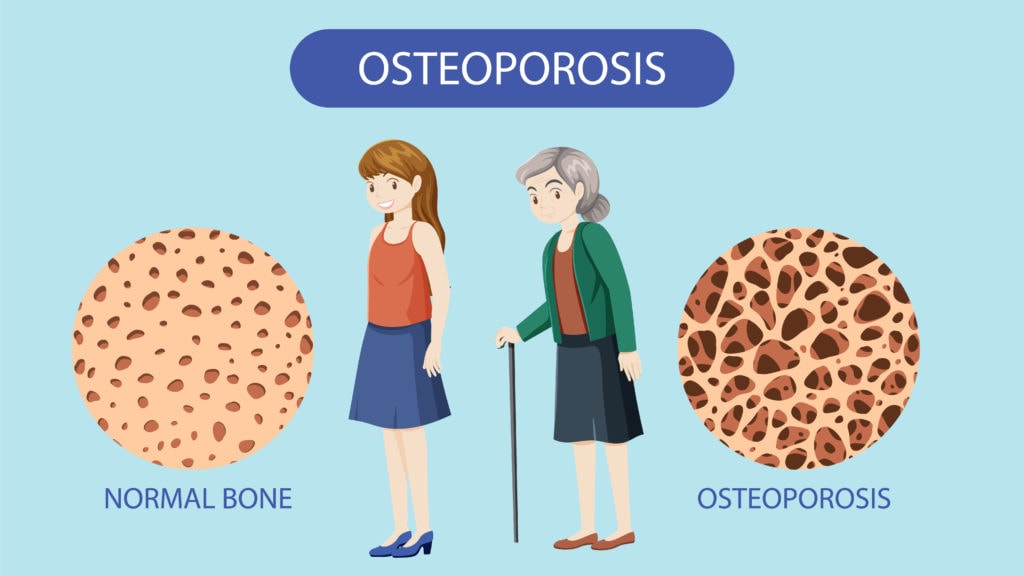
Bones are the foundation that supports our body and allows us to move with ease. Keeping our bones strong and healthy is essential for overall well-being and quality of life. One key player in maintaining bone health is Vitamin D – a sunshine vitamin that plays a important role in various bodily functions, particularly bone health. In this article, we will provide you information about the fascinating world of Vitamin D and how it contributes to the health and vitality of our bones.
Understanding Vitamin D: The Sunshine Vitamin
Vitamin D is a unique nutrient that our body can produce when exposed to sunlight. When sunlight touches our skin, a chemical reaction occurs, converting cholesterol into Vitamin D. This process mainly takes place in the epidermis, the outermost layer of the skin. However, many factors can influence the amount of Vitamin D our body produces, such as geographic location, time of day, season, skin color, and the use of sunscreen. While sunlight is the primary source of Vitamin D, it can also be obtained through certain foods and supplements.
The Connection Between Vitamin D and Bone Health
Vitamin D plays a critical role in maintaining bone health by ensuring the proper absorption and utilization of calcium, an essential mineral for strong bones. The active form of Vitamin D helps the intestines absorb calcium from the food we eat and directs it to the bones. Without enough Vitamin D, human body struggles to absorb calcium effectively, leading to weakened bones. This deficiency can increase the risk of fractures and osteoporosis, a condition where bones become brittle and fragile. Ensuring an adequate intake of Vitamin D can help optimize bone density and reduce the risk of bone-related issues.
The Importance of Vitamin D in Preventing Osteoporosis
Osteoporosis is a common bone disease that affects millions of people worldwide, particularly older adults, and women are more prone to it after menopause. It is characterized by reduced bone density and increased bone fragility, making bones susceptible to fractures even with minor trauma. Vitamin D plays a crucial role in preventing osteoporosis by promoting calcium absorption and enhancing bone mineralization. Additionally, Vitamin D supports muscle function, which is essential for maintaining balance and preventing falls, a common cause of fractures in older individuals. Regular exposure to sunlight, along with Vitamin D-rich foods or supplements, can significantly contribute to reducing the risk of osteoporosis.


Vitamin D Sources: Beyond Sunshine
While sunlight remains the most natural source of Vitamin D, some people may struggle to get enough sun exposure due to factors like geographic location, seasonal changes, or lifestyle choices. However, Vitamin D can also be obtained from dietary sources. Foods rich in Vitamin D include fatty fish (such as salmon, mackerel, and sardines), egg yolks, fortified dairy products, and certain types of mushrooms. It’s important to note that the Vitamin D content in foods can vary, and not all foods contain significant amounts of this vital nutrient. For this reason, Vitamin D supplements are available over-the-counter and can be an effective way to ensure adequate intake, especially for those with limited sun exposure or dietary restrictions.


Vitamin D Deficiency: The Silent Epidemic
Vitamin D deficiency is a widespread concern, affecting people of all ages and backgrounds. Inadequate levels of Vitamin D can lead to various health issues, including bone problems, muscle weakness, and an increased susceptibility to infections. Certain groups are particularly at risk of deficiency, including older adults, people with limited sun exposure, individuals with dark skin, and those with certain medical conditions that hinder Vitamin D absorption. Common signs of Vitamin D deficiency may include bone pain, muscle weakness, fatigue, and a weakened immune system. Regular health check-ups and blood tests can help identify Vitamin D deficiency and allow for timely interventions.
FAQs about Vitamin D and Bone Health
- How much Vitamin D do I need daily for bone health?
To maintain optimal bone health, the recommended daily intake of Vitamin D varies by age. For adults under the age of 70, the general recommendation is 600 to 800 International Units (IU) per day. Adults over the age of 70 are advised to aim for 800 to 1,000 IU daily. However, individual needs may vary, and it’s essential to consult with a healthcare professional to determine the appropriate dosage for your specific requirements. - Can I get enough Vitamin D from sunlight alone?
Sunlight is an fantastic natural source of Vitamin D. Spending 10 to 30 minutes in the sun, two to three times a week, with exposed skin (without sunscreen) during peak sunlight hours can help your body produce sufficient Vitamin D. However, various factors can impact the amount of Vitamin D produced, such as geographic location, time of day, season, skin color, and the use of sunscreen. People with limited sun exposure may need to obtain Vitamin D from dietary sources or supplements. - What are the signs of Vitamin D deficiency?
Vitamin D deficiency may present with various symptoms, including bone pain, muscle weakness, fatigue, and an increased susceptibility to infections. However, some people with mild deficiency may not show any noticeable signs. Blood tests can help determine your Vitamin D levels and identify any deficiency. - Are there any risks associated with excessive Vitamin D intake?
While Vitamin D is essential for health, excessive intake can lead to Vitamin D toxicity, also known as hypervitaminosis D. Excessive Vitamin D can cause elevated calcium levels in the blood, leading to symptoms such as nausea, vomiting, weakness, and even kidney stones. It’s crucial to follow the recommended daily intake and avoid high-dose supplements without medical supervision. - Can Vitamin D supplements interact with medications?
Vitamin D supplements may interact with certain medications, such as corticosteroids, weight-loss drugs, and some anticonvulsants. If you are taking any medications, it’s essential to inform your healthcare provider before starting Vitamin D supplements to avoid potential interactions.
In conclusion, Vitamin D is a vital nutrient that plays a central role in maintaining bone health. From promoting calcium absorption to preventing osteoporosis and supporting overall well-being, this sunshine vitamin is crucial for the health and vitality of our bones. By eating Vitamin D-rich foods, getting regular sun exposure, or using supplements, we can ensure we have enough of this essential nutrient to support our skeletal system. Remember to consult with a healthcare professional for personalized guidance on maintaining adequate Vitamin D levels and optimizing your bone health for a vibrant and active life. So, embrace the power of Vitamin D and unlock the secret to strong and healthy bones !!!
